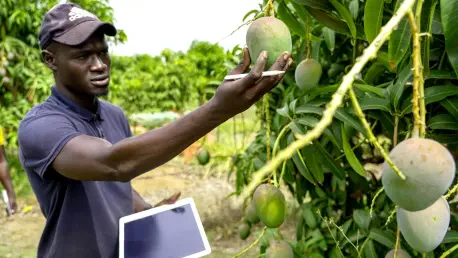The agricultural landscape, often considered a beacon of tradition, has faced a technological metamorphosis by 2025, driven predominantly by digital marketing strategies. As consumer preferences shift toward traceable and sustainable products, the pressure to adopt innovative methods intensifies. Farmers and agribusinesses, often at the core of community economies, are no longer merely players in a local market but are reaching global audiences with the aid of digital transformation. This evolution is not just about selling more products but offering transparency, enhancing trust, and building lasting relationships with customers. The digital age opens doors to strategies once unimaginable, essentially leveling the playing field for small and large agricultural entities alike.
Leveraging AI and Data Analytics in Agriculture
Digital marketing has revolutionized the agricultural sector, with AI and data analytics at the forefront of this transformation. Artificial Intelligence has changed the way marketing campaigns are crafted, providing personalized marketing solutions that cater directly to consumer needs. By analyzing past purchasing behaviors and predicting future trends, AI helps agricultural businesses tailor marketing campaigns that resonate with individual consumers. The use of AI in digital marketing facilitates the creation of more engaging and effective marketing strategies. It allows businesses to deliver personalized content, ultimately leading to increased consumer engagement and higher conversion rates.
Data analytics also plays a crucial role in the digital marketing sphere by driving informed decision-making processes. These technologies provide invaluable insights into market trends, consumer behavior, and product performance. By harnessing the power of big data, agricultural businesses can make strategic decisions about product pricing, distribution channels, and promotional tactics. As data sources become increasingly integrated, the ability of agribusinesses to anticipate market needs and respond accordingly dramatically improves. This foresight not only ensures market competitiveness but sustains long-term growth and success in an ever-evolving marketplace.
Social Media and Mobile Platforms Transform Consumer Engagement
Social media and mobile platforms have redefined how agricultural businesses interact with consumers. Platforms like Instagram, Facebook, and Twitter offer vast networks for connecting with customers more personally and interactively. For agricultural products, story-driven content showcasing authenticity, process transparency, and farming culture resonates deeply with consumers. Live streams from farms, videos about harvesting processes, and engaging posts about sustainable practices provide consumers insight into product origins, cultivating trust and loyalty.
Mobile technology enhances this engagement by reaching customers in real-time, wherever they are. Dedicated mobile applications facilitate seamless interactions, from ordering produce to tracking shipments, benefiting both consumers and sellers. These platforms not only allow real-time customer feedback but also enable agribusinesses to push notifications about offers, new products, or farming updates directly to the consumer’s device. This immediacy in communication results in higher customer loyalty and repeat business, creating a sustainable and interactive relationship between farms and their global customer base.
The Role of Blockchain in Ensuring Transparency and Trust
Transparency and trust have become paramount in consumers’ minds, especially with the increasing demand for organic and ethically sourced products. Blockchain technology plays a pivotal role in enhancing these aspects within agriculture by providing an immutable ledger of transactions and product histories. From field to consumer, every step is recorded, ensuring traceability and authenticity of agricultural products. This transparency helps build consumer trust, as customers can verify the journey of their food, ultimately influencing purchase behaviors positively.
Blockchain’s application goes beyond just transparency; it also facilitates better supply chain management. By reducing discrepancies and streamlining transactions, blockchain solutions ensure efficiency in logistics and inventory management. This efficiency reduces costs and minimizes risks associated with fraud or mislabeling. For farmers and distributors, it presents the opportunity to command premium pricing for verified sustainable practices, providing an economic incentive for maintaining transparency. Consequently, blockchain doesn’t just enhance trust but also encourages ethical and accountable agricultural practices.
Integrating E-commerce for Expanding Market Reach
The emergence of e-commerce has allowed agricultural products to penetrate markets far beyond traditional geographical boundaries. Online platforms enable farmers and agribusinesses to sell directly to consumers worldwide, circumventing traditional middlemen and increasing profit margins. E-commerce platforms are crucial in this expansion, offering sophisticated tools to manage inventories, set dynamic pricing, and deploy digital marketing campaigns tailored to diverse demographics.
By utilizing these platforms, agriculture businesses can create comprehensive profiles with detailed product information, facilitating informed purchase decisions by consumers. The online setting also provides customers with the convenience of buying agricultural products at the click of a button, encouraging repeat business and fostering customer loyalty. Additionally, e-commerce solutions enable integration with other digital marketing tools, like analytics and social media, to enhance market reach and consumer engagement. This broadens the scope for agribusinesses to build a diversified and resilient customer base.
Holistic Approach to Traditional and Digital Marketing
While digital technology is reshaping agricultural marketing, the blend of traditional marketing methods remains vital for a comprehensive approach. In markets where physical presence and direct community engagement matter, integrating tried-and-tested techniques with digital innovations ensures a balanced marketing strategy. The convergence of these approaches allows agribusinesses to cater to varied customer preferences and maintain a strong local presence while reaching broader audiences globally.
Traditional methods, such as attending agricultural fairs or local markets, provide opportunities for personal interaction and feedback. When combined with digital strategies like SEO and pay-per-click advertising, these methods create synergistic effects that enhance consumer reach and engagement. The holistic approach not only diversifies marketing channels but also offers multiple touchpoints for consumers to engage with brands, increasing the likelihood of conversion and long-term loyalty.
The Future Landscape of Agricultural Marketing
The agricultural sector, traditionally viewed as a stronghold of time-honored practices, has undergone a significant technological transformation by 2025, largely driven by digital marketing techniques. As consumers increasingly demand products that are both traceable and sustainable, the need for innovative approaches has grown. Farmers and agribusinesses, long considered vital components of local economies, are now extending their reach to international markets through digital advancements. This transformation isn’t just about increasing sales; it’s about providing transparency, fostering trust, and cultivating enduring customer relationships.
In the digital era, new strategies that were once beyond imagination are now within reach. This shift has effectively leveled the playing field, providing both small-scale and large-scale agricultural businesses with equal opportunities to compete. By embracing digital tools, these entities can offer detailed insights into product origins and sustainability measures, which aligns with the growing consumer preference for authenticity and responsibility.
The digital revolution in agriculture has redefined how farmers and agribusinesses operate, empowering them to expand their influence globally. This change underscores a broader narrative of how digital marketing is reshaping industries traditionally rooted in local contexts, emphasizing the importance of innovation and adaptability in a rapidly evolving world.









